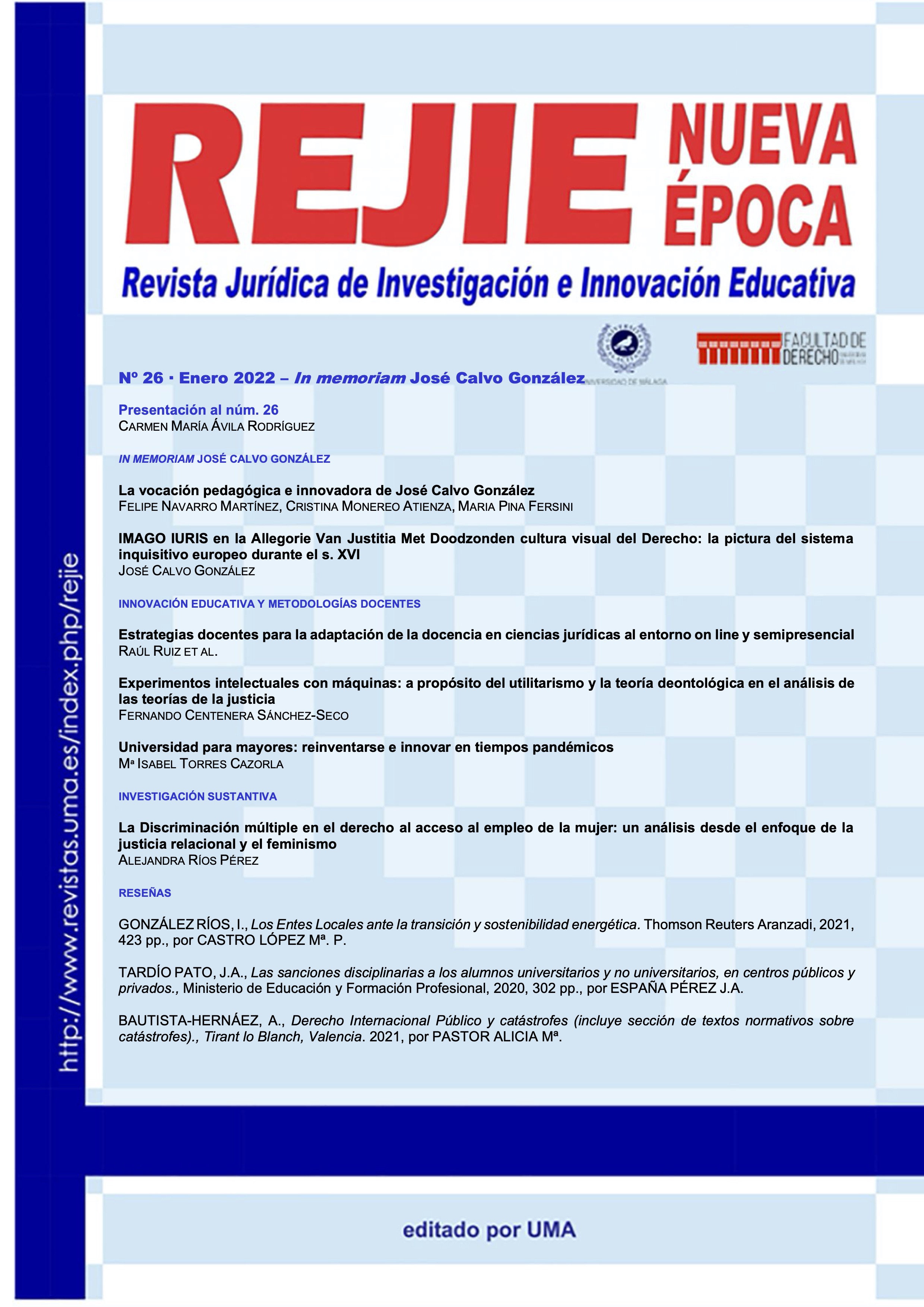Senior University: Reinvention and Innovation in a Pandemic Context
DOI:
https://doi.org/10.24310/rejie.vi26.14131Keywords:
COVID-19, lifelong learning, right to education, SDG 4, Senior University.Abstract
This article explains the practical experience of her author as a consequence of the pandemic at the so-called Senior University (Aula de Mayores +55) of the University of Málaga. Lifelong learning opportunities for all, together with the right to education in a pandemic context is a key point. The Senior University is an instrument for the social projection of the Universities and also has different names (depending of the University). This is an opportunity provided to people aged 50-55 years and over, to expand their knowledge about different subjects (Sanitary questions, Social and Legal Sciences, Literature, Arts, Economics, Foreign Languages, digital skills, among others). This is an opportunity, coming for the first time to the University (or coming back) as a lifelong socialization and learning experience. The Senior University has had to be adapted to the pandemic context (a new experience for students and teachers, developed in most cases via on-line tools). The personal experience of the author at the University of Málaga (Aula de Mayores+55) is the primary aspect to be considered, including an analysis of the practice followed by Spanish Universities. The personal motto is reinvention and innovation in a pandemic context.
Downloads
Metrics
References
a) Monografías y artículos:
ABERLE, N. y HOEKSTRA, M.M. (2020), Resilience Based Crisis Management in Public Educational Institutions at the Time of Global Pandemic of COVID-19: The Implications for Ensuring SDG4, en http://mau.diva-portal.org/smash/record.jsf?pid=diva2%3A1472829&dswid=-5220.
BAUTISTA-HERNÁEZ, A. (2021), Derecho Internacional y Gestión de Catástrofes: Grandes Avances y Retos Pendientes, Tirant lo Blanch, Valencia.
BONILLA GUACHAMÍN, J.A. (2020), “Las dos caras de la educación en el COVID-19”, CienciAmérica, vol. 9 (2), en http://201.159.222.118/openjournal/index.php/uti/article/view/294/461, 10 pp.
BURGOS, D., TLILI, A. y TABACCO, A. (eds.) (2020), Radical Solutions for Education in a Crisis Context. COVID-19 as an Opportunity for Global Learning, “Education in a Crisis Context: Summary, Insights and Future”, capítulo de estos mismos autores, Springer, Singapur, Berlín, pp. 3-10.
COTINO HUESO, L. (2020), “La enseñanza digital en serio y el derecho a la educación en tiempos del coronavirus”, Revista de Educación y Derecho, n. 21, 29 pp.
GAIRÍN, J., RODRIGUEZ-GÓMEZ, D., ARMENGOL. C. y DEL ARCO, I. (2013), “El acceso a la Universidad para personas mayores en España. Los programas universitarios para personas mayores: revisando la realidad”, Revista de Orientación Educacional, v. 27, núm. 51, pp. 45-65.
MALONEY, E.J. y KIM, J. (2020), The Low-Density University: 15 Scenarios for Higher Education, Johns Hopkins University Press, Baltimore.
MARTIN, J.P. (2016), “SDG 4: Lifelong, Inclusive and Equitable Education: Goal 4”, en International Society and Sustainable Development Goals, DURÁN y LALAGUNA, P., DÍAZ BARRADO, C.M. y FERNÁNDEZ LIESA, C. (eds.), Aranzadi Thomson Reuters, Madrid, pp. 231-247.
MARCO, B. (2020), “Coronavirus, COVID-19 and the Right to Education. Lessons to be Learned (A Contribution to Good Practices)”, en https://www.ohchr.org/_layouts/15/WopiFrame.aspx?sourcedoc=/Documents/Issues/Education/COVID19/BertaMarco.docx&action=default&DefaultItemOpen=1, 5 pp.
MARTÍNEZ HEREDIA, N. y RORÍGUEZ- GARCIA, A.-M. (2018), “Alfabetización y competencia digital en personas mayores: el caso del aula permanente de formación abierta de la Universidad de Granada (España)”, Revista Espacios, vol. 39, núm. 10, p. 37, accesible en http://revistaespacios.com/a18v39n10/a18v39n10p37.pdf.
MORENO CRESPO, P.A. y CRUZ DÍAZ, M.R. (2012), “Promoción de la calidad de vida a través de los programas socioeducativos para mayores, Universidad y Mayores”, I Congreso Virtual Internacional sobre Innovación Pedagógica y Praxis Educativa, Innovagogia 2012, Libro de Actas, 21, 22 y 23 de noviembre de 2012, pp. 1522-1533, accesible en https://www.upo.es/cms1/export/sites/upo/aula-mayores/cuadernos/documentos/promocion_calidad_vida.pdf.
MURILLO, F.J. y DUK, C. (2020), “El Covid-19 y las brechas educativas”, Revista Latinoamericana de Educación Inclusiva, vol. 14, núm. 1, accesible en https://scielo.conicyt.cl/scielo.php?pid=S0718-73782020000100011&script=sci_arttext.
QUINTANA AVELLO, I. (2020), “Covid-19 y Cierre de Universidades. ¿Preparados para una educación a distancia de calidad?”, Revista Internacional de Educación para la Justicia Social, vol. 9, núm. 3 extraordinario, 11 pp., accesible en https://revistas.uam.es/riejs/article/view/12232/12094.
RODICIO-GARCÍA, M.L., RIOS-DE-DEUS, M.P., MOSQUERA-GONZÁLEZ, M.J. y PENADO ABILLEIRA, M., “La Brecha Digital en Estudiantes Españoles ante la Crisis de la Covid-19”, Revista Internacional de Educación para la Justicia Social, vol. 9, núm. 3 extraordinario, pp. 103-125, en https://revistas.uam.es/riejs/article/view/riejs2020_9_3_006/12444.
RUIZ. G.R. (2020), “Marcas de la pandemia: el derecho a la educación afectado”, Revista Internacional de Educación para la Justicia Social, vol. 9, núm. 3 extraordinario, pp. 45-59, en https://ri.conicet.gov.ar/bitstream/handle/11336/108882/CONICET_Digital_Nro.fad2c5dc-48ef-40e2-b804-c53a7536fc86_A.pdf?sequence=2&isAllowed=y.
TORRES CAZORLA, M.I. (2001), “La sociedad internacional contemporánea: problemas recientes. Una aproximación a la crisis de las Naciones Unidas en los albores del siglo XXI”, Aula de Formación Abierta 2000, Universidad para mayores, pp. 181-188; (2002) “Las repercusiones de los acontecimientos del 11 de septiembre de 2001 en la sociedad internacional contemporánea”, Aula de Formación Abierta 2002, Universidad para mayores, pp. 293-299; (2003) “La extradición en Derecho Internacional”, Aula de Formación Abierta 2002/2003, Universidad para mayores, pp. 403-408.
VALLE APARICIO, J.E. (2014), “Educación permanente: los programas universitarios para mayores en España como respuesta a una nueva realidad social”, Revista de la Educación Superior, vol. XLIII (3), n. 171, julio-septiembre 2014, pp. 117-138.
b) Otros documentos de consulta:
BOE (Sección dedicada a la COVID-19): https://www.boe.es/biblioteca_juridica/index.php?tipo=C.
UNESCO (Organización de Naciones Unidas para la Educación, la Ciencia y la Cultura):
Información sobre el ODS 4: https://es.unesco.org/gem-report/node/1346
Declaración de Incheon: http://www.unesco.org/new/fileadmin/MULTIMEDIA/HQ/ED/ED_new/pdf/FFA-ENG-27Oct15.pdf.
Marco de Acción Educativa 2030: https://es.unesco.org/news/adopcion-del-marco-accion-educacion-2030.
Additional Files
Published
How to Cite
Issue
Section
License
Sin perjuicio de lo dispuesto en el Texto Refundido de la Ley de Propiedad Intelectual, aprobado por Real Decreto Legislativo 1/1996, de 12 de abril, y conforme al mismo, los autores/as ceden a título gratuito, de modo no exclusivo y sin límite temporal los derechos para difundir, reproducir, comunicar y distribuir, en cualquier formato actual o futuro (papel o electrónico), a la Universidad de Málaga (UMA), a fin de que sea publicado en REJIE Nueva Época.
Al realizar el envío, el autor declara que el contenido esencial del mismo no ha sido publicado ni se va a publicar en ninguna otra obra o revista mientras esté en proceso de evaluación en REJIE Nueva Época, comprometiéndose en todo caso a comunicar de inmediato al equipo editorial de la revista cualquier proyecto de publicación de dicho texto, y citando expresamente a la revista en el nuevo proyecto.
Todos los contenidos publicados por REJIE Nueva Época están sujetos a la licencia de Creative Commons Reconocimiento 4.0 Internacional, cuyo texto completo se puede consultar en https://creativecommons.org/licenses/by/4.0/legalcode
Conforme a la misma, se permite la copia, distribución, comunicación pública, obras derivadas y el uso comercial de los contenidos siempre que la fuente y el autor del texto sean citados Así, cuando el autor/a envía su colaboración está explícitamente aceptando esta cesión de derechos de edición y de publicación.
Es responsabilidad de los autores obtener los permisos necesarios de las imágenes que están sujetas a derechos de autor.







20.png)
